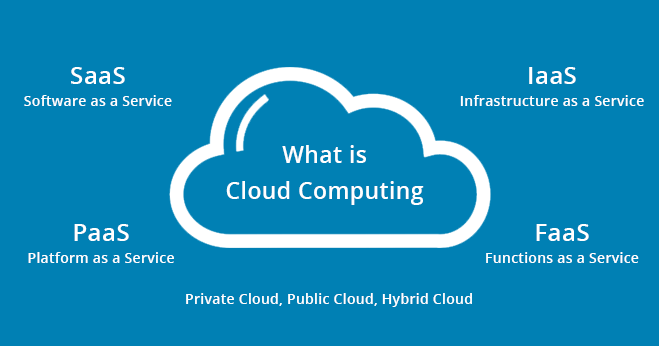Cloud Computing Overview
Cloud computing refers to the process of storing and accessing programs and data over the Internet instead of your computer's hard drive. In this model, customers pay their cloud provider a subscription fee instead of buying new hardware or software. To better understand what is cloud computing, we have listed some of its types below.

The Different Types of Cloud Computing
- SaaS (Software as a Service)
- PaaS (Platform as a Service)
- IaaS (Infrastructure as a Service)
- FaaS (Functions as a Service)
- Private Cloud
- Public Cloud
- Hybrid Cloud
Type No. 1: SaaS (Software as a Service)
A type of public cloud computing service that delivers software on the web through a browser or an app. Some of the common SaaS applications available today are Office 365, Salesforce, Cisco WebEx, and Netflix. When using this service, customers subscribe to the software typically on a monthly basis rather than purchasing it. They also have the option to end their subscription whenever they want to. With SaaS, updates are usually free of charge and applied automatically by the software provider.
Type No. 2: PaaS (Platform as a Service)
In this type of cloud computing, users can create applications or programs using tools supplied by the provider. PaaS is hosted in the cloud, and users can access them through their web browser. This service would only be beneficial to you if you are a developer since this provides a platform for developing applications. Some examples of PaaS are Google App Engine, Salesforce’s Heroku, Pivotal’s Cloud Foundry, and Red Hat’s OpenShift.
Type No. 3: IaaS (Infrastructure as a Service)
In this model, a cloud provider hosts the infrastructure components found in data centers. This consists of servers, storage, and networking hardware, as well as the virtualization or hypervisor layer. In addition to this, they also supply services such as detailed billing, monitoring, log access, security, load balancing, and clustering, as well as storage resiliency, such as backup, replication, and recovery. These help users implement greater levels of automation and orchestration for important tasks. Amazon Web Services (AWS) and Google Cloud Platform (GCP) are just some of the IaaS providers.
Type No. 4: FaaS (Functions as a Service)
This model is a serverless way to implement modular blocks of code. FaaS allows developers to write and update a piece of code on the fly, which can then be executed in response to an event such as a form submission or an uploaded file. By utilizing serverless code like FaaS, web developers can concentrate on writing application code, while the provider oversees the server allocation and backend services. The major cloud providers that offer FaaS include AWS Lambda, Azure Functions, Google Cloud Functions, and IBM OpenWhisk.
Type No. 5: Private Cloud
Operated by a single organization, a private cloud is a model of cloud computing that has a distinct and secure cloud-based environment. Private clouds ensure their security by giving access only to connections made from one organization’s firewall, dedicated leased lines, and on-site internal hosting. However, take note that the costs are usually high when using a private cloud as the hardware has to be updated occasionally and security has to be kept in place.
Type No. 6: Public Cloud
In this type of cloud computing service, the cloud provider makes resources available to the public through the internet. While the resources vary depending on the provider, it usually includes storage capabilities, applications, or virtual machines. Some public cloud services are free of charge while some others use a subscription or a pay-per-usage model. Providers have specialized security staff that automates security functions and monitors the system for any issues. Strict policies are being employed in public clouds to ensure that the user’s data will not be accessed by other cloud tenants.
Type No. 7: Hybrid Cloud
The hybrid cloud combines the benefits of both the private cloud and the public cloud. It carries the private cloud’s high-security features and the public cloud’s fast connection and easy accessibility. In this type of model, two or more cloud infrastructures remain unique entities but they are bound together by standardized or proprietary technology. Having a hybrid cloud balances various environments based on the requirements of your organization.
Conclusion - Swift System’s Cloud Computing
With the ever-increasing need for scalable and economical network structures, it would be ideal to get a reliable cloud computing service for your business. Based on your company’s needs, you can choose from the different types of cloud computing options available. Hiring a cloud computing provider can increase the efficiency of your business and strengthen the security of your data.
